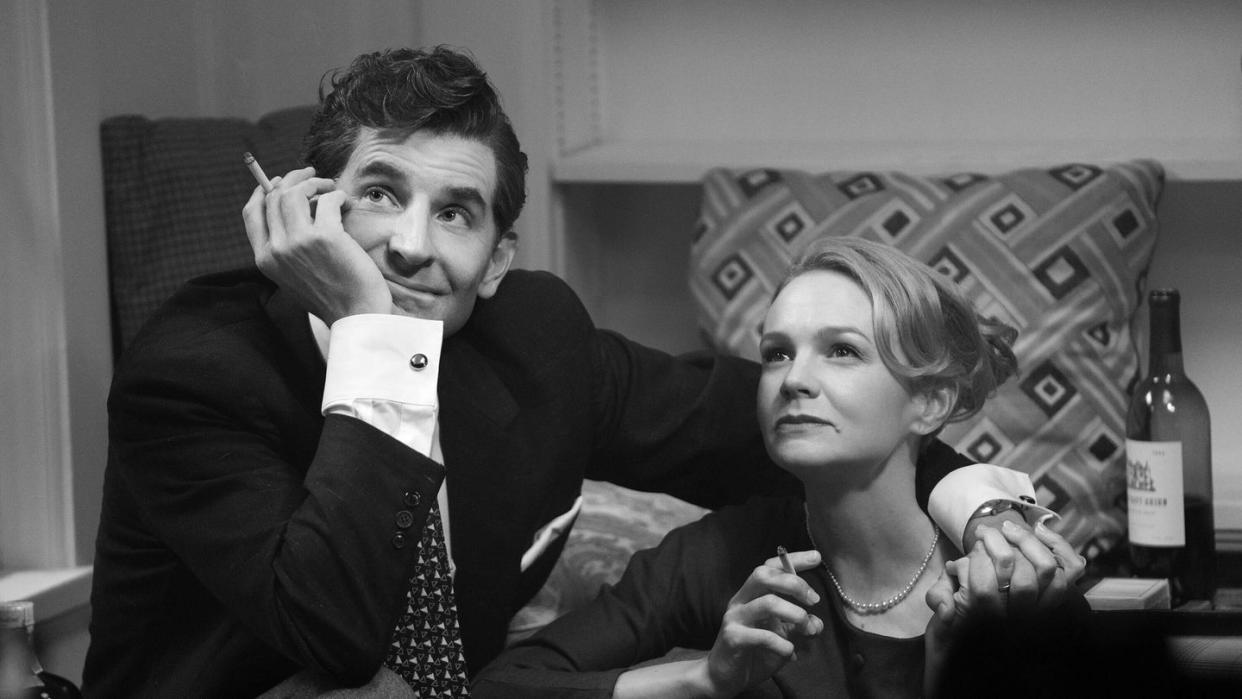Okay, We Need to Talk About the Ending of ‘Maestro’

Run, don’t walk. Bradley Cooper’s Maestro is officially streaming on Netflix. At 2 hours and 11 minutes, the new Oscar-nominated film is the ultimate distraction from all the bad weather that tends to plague February and March. A reason to sit on your couch, if you will. Especially now that the film is up for a whopping seven Oscar nominations (including Best Picture), it's time to give it a serious look before the ceremony on Sunday, March 10.
The film is at our fingertips thanks to the suits at Netflix HQ. Maestro stars Bradley and Carey Mulligan as composer Leonard Bernstein and his wife, Felicia Montealegre. The film explores the meteoric rise of music’s most talented composer, as well as his intimate relationships with men and women throughout his life. We're here to talk about the ending specifically, though.
With Maestro, Bradley takes a big swing, telling a new story in a way that feels nostalgic. The film is peak old Hollywood, despite the fact that it exists in 2024. The cinematography takes the ultimate crown here, but everything from the performances (read: accents) to the writing is top notch. Maestro’s only real fault lay in its standard approach. The swing Bradley took was big in scale, but not terribly inventive. Maestro is a biopic as we know it, but a beautiful one at that.
Okay, but can we talk about the ending?
If you’ve found yourself here, our assumption is that you’ve made it through the 2 hours and change that is Maestro. Either that, or you’re looking for SparkNotes. Come one, come all, to our breakdown of everything that is Maestro, especially that ending.
Maestro opens at the end, with an aging and widowed Leonard Bernstein playing a tune to a camera crew, reflecting on the loss of his wife Felicia. Suddenly, we are thrust backward in time to 1943 when a 25-year-old Leonard is given a career-changing opportunity–to step up as understudy and conduct the New York Philharmonic at Carnegie Hall. At this time, he’s in whatever the 1943 version of a situationship is with a clarinet player named David, played by Matt Bomer. Soon after, he meets actress Felicia Montealegre, played by Carey Mulligan, and the pair fall madly in love and pop out three kids.
Fast forward a few years, Leonard and Felicia have made it big. They are wealthy, they are respected, they are popular, and they are now being filmed in color. The pair begin experiencing some friction, sparring over Leonard’s “homosexual tendencies,” as well as his reliance on drugs and alcohol. These are the dark years for the lovers, marked by one explosive Thanksgiving scene that rivals the tensions of The Bear’s “Fishes” episode. Still, the pair remain married and ultimately reconcile following Leonard’s historic 1973 conducting of Mahler’s Resurrection Symphony in England.
Fast forward again (a familiar biopic trope), and Felicia is diagnosed with lung cancer and ultimately dies in 1978, in the arms of her husband. Leonard is devastated by the loss, and the next time we see him is nine years later as he teaches conducting, parties hard, and engages in affairs with his male students.
We see him again, once more at that opening piano in front of the familiar camera crew, soaking in the despair of the tragic love story we just watched unfold. He expresses how much he misses her, and is flooded with the memory of her in their youth, their early days of romance.
That’s the end of Maestro. Of course, the thread that sews all of these plot points together in marvelous fashion is the music. Leonard’s greatest love was music, only rivaled by his love for Felicia. His life was the music, interrupted in moments by Felicia–a welcome, and necessary, interruption at that.
You Might Also Like


